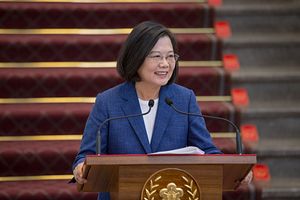Taiwan began production of its first domestically made submarines on Tuesday, a step toward boosting its asymmetric warfare capabilities as Beijing continues its military intimidation of the country.
President Tsai Ing-wen, who oversaw a ceremony at a shipyard in Kaohsiung, said the submarine “is an important part of allowing our navy to develop asymmetric warfare and to intimidate and block enemy ships from surrounding Taiwan’s main island.”
It marks the long-planned launch of a submarine program that will see Taiwan build eight diesel-electric attack submarines, the first of which is expected to be completed by 2024.
Taiwan has assertively sought to boost its asymmetric capabilities and prevent a Chinese invasion by purchasing billions in U.S. weapons, including air-to-ground missiles, a coastal defense missile system, and surveillance drones.
Recently purchased weapons, such as Boeing-made SLAM-ER missiles the U.S. agreed to sell to Taiwan in October, can potentially be used for offensive or counterstrike purposes. Past U.S. administrations have refused to sell attack-focused weapons, such as submarines, to Taiwan.
The indigenous submarines will revamp an antique fleet that consists of four submarines, two of which are Dutch-made submarines built in the 1980s. The other two were constructed during World War II and transferred to Taiwan from the U.S. Navy in the 1970s and are now used mostly for training.
Taiwan launched its indigenous submarine program in 2014, following years of debate over whether to domestically produce the submarines or purchase them from a foreign country. It has faced difficulties in acquiring submarine technology from other countries for the indigenous submarines due to objections from Beijing.
The state-run shipbuilder China Shipbuilding Corporation (CSBC) and the arms developer Chungshan Institute of Science and Technology were awarded the contract for the submarines in 2016.
China’s People’s Liberation Army (PLA) has stepped up military exercises near Taiwan’s airspace and maritime zones. These exercises escalated after the visits of two top U.S. officials in August and September.
The Chinese threat was at the top of Tsai’s mind at Tuesday’s ceremony, during which she said the submarines “will certainly let the world know our persistence in safeguarding our sovereignty.”
The program’s cost has been criticized domestically since it was announced. Taiwan raised its 2021 military budget to $15.2 billion, the highest ever, but the island’s military establishment has faced steady criticism over its shift to more modern defense strategies and the readiness of both its active and reserve forces.
The design phase alone of the indigenous submarine project cost an estimated $104 million, while the construction of the submarines themselves will cost more than $16 billion.
Some defense experts have called on Taiwan to scrap its submarine program. In a November 2019 op-ed in The Diplomat, Michael A. Hunzeker and Joseph Petrucelli argued the submarines would be difficult for Taiwan’s inexperienced shipbuilders to construct and would have limited utility deterring a Chinese invasion, instead being “among the highest priority targets” for the PLA.
“Given rotation and maintenance requirements, an eight-ship [submarine] fleet would likely have only a small number, maybe two or three, submarines deployed on a day-to-day basis, leaving the rest vulnerable in port,” they wrote.
Wang Jyh-perng, a former submarine officer in Taiwan’s navy, echoed similar doubts in 2015, writing with Navy reserve Rear Admiral Tan Chih-lung that having even four or five combat-ready submarines is not enough. “In a real conflict, ‘better than nothing’ is of little comfort,” they wrote.
The ruling Democratic Progressive Party (DPP) has been more eager over the years than the opposition Kuomintang (KMT) to kickstart the indigenous submarine program. In 2014, prior to the program’s approval, the DPP accused former President Ma Ying-jeou of the KMT of stalling on the project in a policy paper.
The submarine program is popular within Taiwan’s military establishment, especially when measured against alternatives, but given domestic and international criticism of that establishment, it is uncertain whether the program will prove the most cost-effective way for Taiwan to spend its newly raised military budget.

































